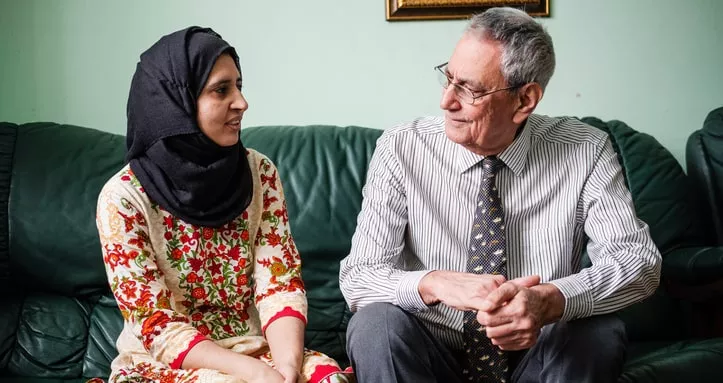
More people with diabetes in England added to list of clinically extremely vulnerable people
The UK Government has announced a new approach for identifying and protecting individuals in England who have the highest risk of serious harm if they get coronavirus.
An additional 1.7 million people in England will now be classed as being clinically extremely vulnerable.
This will entitle them to get their coronavirus vaccine earlier, and to get support from the government to shield, including additional financial support, specifically furlough and Statutory Sick Pay. Some of these people will already have had their vaccinations due to being in a higher priority group based on age.
People in this group who haven’t already had a first dose of their coronavirus vaccine will be invited to come forward by the NHS as a priority.
At the present time this approach is only being taken in England and the governments in Northern Ireland, Scotland and Wales are considering how the risk prediction model can be used for their own shielding lists
A new approach for measuring risk from coronavirus
The UK Government has adopted a new approach to predict the risk a person has from becoming seriously unwell from coronavirus. This involves a new tool called QCovid Population Risk Assessment, which has made it possible to identify people at higher risk through their medical records and quickly alert both them and their healthcare teams.
A wider definition of clinically extremely vulnerable
Up to now, only people with a narrow set of conditions had been classed as clinically extremely vulnerable by the government. Being classed as clinically extremely vulnerable gets you earlier access to the coronavirus vaccine, and support to shield.
We think more people with diabetes should have been classed as clinically extremely vulnerable earlier on in the pandemic, and have been calling for a more individual approach to assessment of risk. Many people with diabetes were exposed to more risk from coronavirus than they should have been.
Our Director of Policy, Bridget Turner, welcomed the change:
“The long-awaited deployment of the risk tool in England to assess individual risk is a welcome step that will protect those people with diabetes who are at highest risk of harm if they develop coronavirus. Many of these people will not have been identified as clinically extremely vulnerable before because a combination of different risk factors was not previously used to define risk. It’s reassuring that these people will now be urgently prioritised for the vaccine, could be supported to work from home, and receive financial support if they cannot do so.
“Diabetes UK has long been calling on the governments across the UK and the NHS to consider factors such as obesity, age and ethnicity in combination with diabetes, when assessing individuals’ risk. It’s encouraging to see these risk factors are now being recognised and acted on in England. We hope Northern Ireland, Scotland and Wales will soon follow suit in using this risk tool, so people with diabetes across the UK can access the support they need to keep themselves safe.
“We know being contacted out of the blue and told you are clinically extremely vulnerable may be very worrying. We also know that since the start of the pandemic many people with diabetes have faced heighted anxiety, given the well documented data about diabetes and Covid-19 risk. Our helpline is here for you to answer any questions or worries you may have.”
Looking at your own risk
Your age, ethnicity and any medical conditions you may have are all important when considering your risk from becoming seriously unwell from coronavirus.
People with diabetes have been hit hard by the pandemic – but we know the impact has not been the same for everyone, with some people being much more likely to become seriously unwell if they catch the virus than others.
We also know that many people with diabetes have found it difficult to have a conversation with their GP or healthcare teams about wanting to shield, and many felt the guidance from the government wasn’t good enough. We know this has made existing inequalities worse, as those who are often least able to speak up for themselves to be added to the shielding list are disproportionately impacted by the risk of Covid-19.
Update on our letter to the Chief Medical Officers
In January, we wrote to the four Chief Medical Officers of the UK to urgently ask that people who meet certain criteria be placed immediately on the shielding list, and so into the Clinically Extremely Vulnerable category.
The Chief Medical Officers wrote back to say that it would not be possible to extend the shielding list in the way we proposed, although we now know that the new risk prediction approach covers both age and a range of conditions which are key diabetes complications, as well as other individual risk factors including ethnicity, BMI, and deprivation level – all of which are known to increase the risk of harm to a person with diabetes.
We will continue to work with government and the team of researchers behind QCOVID to ensure the risk prediction approach takes account of all key evidence about diabetes and Covid-19 risk, including a person’s HbA1c. We will also be working with governments in Wales, Scotland and Northern Ireland to understand how this approach could be applied across all four nations of the UK.
Getting support
We know being contacted out of the blue and told you are clinically extremely vulnerable may be very worrying. We also know that since the start of the pandemic many people with diabetes have faced heighted anxiety, given the well documented data about diabetes and coronavirus risk.
If you’re worried or not sure about what this news might mean for you our helpline team is here to support or provide more information. Call 0345 123 2399 to speak to one of our highly trained advisors about any questions or concerns.
